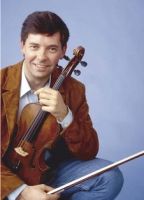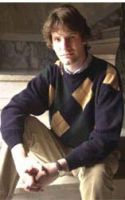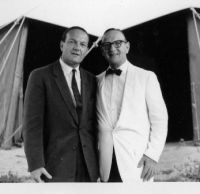
Sun and Shadow at the CCO
Tchaikovsky
was eminently capable of expressing anguish and despair, but the composer of
the “Pathetique” Symphony had a different assignment Sunday afternoon at Music
Hall on an all-Russian program by the Cincinnati Chamber Orchestra.

Conducted by CCO music director Mischa Santora,
the program included Tchaikovsky’s Serenade, Op. 48, one of his happiest works,
and the serenely beautiful Andante Cantabile from his String Quartet No. 1,
arranged for viola.

The gloom
and doom fell to Prokofiev and Alfred Schnittke, specifically the Andante from
Prokofiev’s 1930 String Quartet No. 1 and Schnittke’s Monologue for Viola and Strings. It made for a schizophrenic kind of program,
but it provided a welcome showcase for the able (23) CCO strings.
Guest artist
in Schnittke’s tenebrous Monologue was violist Roberto Diaz. Former principal violist of the Philadelphia
Orchestra, now president of Philadelphia’s Curtis Institute of Music, Diaz met
the challenge of both extremes handily.
Not incidentally, he also demonstrated what the viola can do.
Prokofiev
was first up with his Andante, a stern movement, beginning in a melancholy
march mode. Memorial Hall’s unflattering
acoustics seemed to intensify the impression, which was ultimately one of pain,
struck home at one point with hammered non-harmonic tones by the upper strings
against the basses.
Tchaikovsky’s
Serenade, performed by the CSO earlier this month in Music Hall, got an up
close presentation in Memorial Hall and a fine performance by Santora and the
CCO. The stately introduction led into a
brisk, energized opening movement, following by a Waltz that momentarily turned
the hall into a ballroom, or perhaps a turn by the corps de ballet. The Elegy glowed with feeling and nuance,
Santora knowing just how to taper one phrase seamlessly into another.
The
folk-themed finale was full of zest and good fun, capped by the always momentous
sounding return of the introductory music.
Alto member
of the violin family, the viola has built-in disadvantages as a solo
instrument. It is larger and heavier
than the violin, but held under the chin like a violin, making it harder to get
around on. Pitched an octave higher than
the cello, it is too small to project a cello-like sound. (If it were larger, it couldn’t be held under
the chin.) So the viola is stuck with
greater technical demands and less ability to be heard, which is also
characteristic of middle voices in general.
The viola
was pretty much ignored in solo literature until the 20th century,
when violists – and violist/composers like Paul Hindemith – began to expand its
possibilities. Most viola concertos were
written after 1900, and now there are quite a few to choose from. Schnittke wrote an important one in 1985. His 1989 Monologue shares its seriousness and
technical challenges, with lots of disjunct writing, leaping into the viola’s topmost
register, etc.
Later in the
15-minute work, he displayed a dark, caramel tone, enhanced by fingering in
high positions (he plays the ca. 1600 Ex-Primrose Amati once owned by the great
Scottish violist William Primrose).

To end the
concert – and lighten the effect of the Monologue – Diaz played Tchaikovsky’s
well-loved Andante Cantabile. He made it
pure romance, seemingly never playing on two strings when he could finger
something entirely on one to enrich the tone quality.
The CCO’s next concert is March 21 at 2 p.m.
at Memorial Hall and 7:30 p.m. at Anderson Center in Anderson Township. Mischa Santora will conduct. Soloists are soprano Melody Moore and tenor
Mark Panuccio in arias and duets from Italian opera. Information and tickets at (513) 723-1182,
ext. 102.